A student organisation or a right-wing affiliated, upper-caste group? sunday mid-day tries to deconstruct the storm that is the Akhil Bharatiya Vidyarthi Parishad (ABVP)
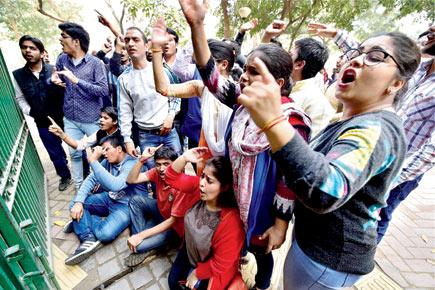
Mumbai, Hyderabad and New Delhi: His voice brimming with confidence, Aniket Ovhal, an MSc Computer Science student from Matunga's Ruia College, says the Akhil Bharatiya Vidyarthi Parishad (ABVP) is largely a student body that acts as a stepping-stone for the talented in the city's college campuses. "In the 1990s, the ABVP used to conduct big cultural programmes, where students with 'pratibha' (talent) found a platform to showcase their skills. Now, almost every college in the city has an inter-collegiate cultural competition, and we are joining hands with them to do more," says the 26-year-old secretary of the body's Mumbai Mahanagar unit. Ovhal may be pushing the ABVP as a talent-hunting platform, but, in light of recent events, the ABVP's record comes across as less a talent-hunting organisation, and more a giant that has woken up.
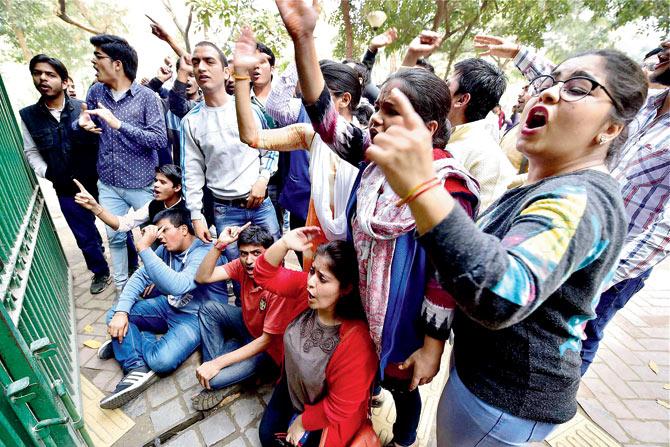
Students of ABVP shout slogans during a protest at Delhi University campus on Saturday. On its website, ABPV says: We are ‘above partisan politics’ but we accept that social activity cannot be non-political in a strict sense. However, critics says, ABVP is today, fucntioning as the students wing of the ruling Bharatiya Janata Party. PIC/PTI
ADVERTISEMENT
From Vemula to JNU
On January 17, the suicide of Rohith Vemula, a Dalit scholar at Hyderabad University, brought to the fore university politics and the ostracisation that Vemula, and other members of the Ambedkar Students Association (ASA), allegedly suffered at the university. In July 2015, ASA had had a clash with the ABVP after the latter protested against the former's support to 1993 bomb blast accused Yakub Memom, who was awarded the death penalty. The suicide polarised not just student politics across the country, but also political parties that used the opportunity to align with either ABVP or Vemula and his supporters. What quickly took the attention away from Hyderabad was when ABVP, earlier this month, stalled an agitation at Delhi's Jawaharlal Nehru University (JNU) against the 2013 hanging of Afzal Guru, convicted as a terrorist in the 2001 Parliament attack case. In videos that have now gone viral, the crowd — there have been been allegations that not all those present were JNU students — raised slogans against India and the Indian government. What ensured that the issue snowballed into a full-fledged controversy is the arrest, and further attacks, on the president of the JNU student's union Kanhaiya Kumar. And, while students and the country's intelligentsia stand on one side of the faultline, the ABVP stands on the other with its ideological parent, the ruling Bharatiya Janata Party (BJP) for company.
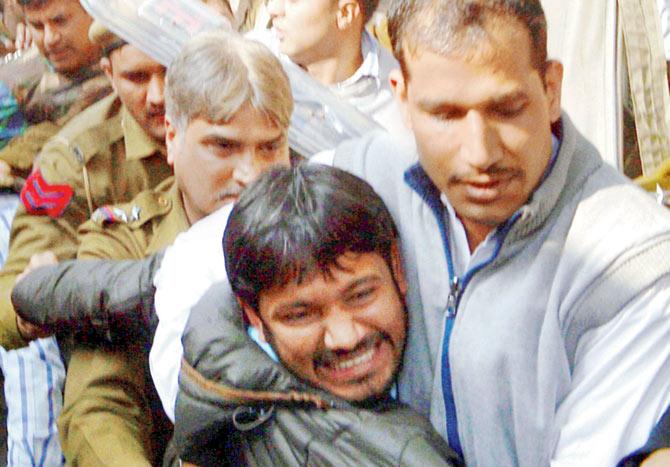
JNUSU President Kanhaiya Kumar, arrested on charges of sedition, being produced at Patiala House Courts in New Delhi on Wednesday. PTI
Going right-wing in TISS
Two weeks ago, Sunday mid-day reported that the ABVP had seen a phenomenal rise in membership in the city. Within just a year, the numbers in their ranks had risen from 10,000 to 45,000. While focussed recruitment — "we targeted apolitical students and explained how ABVP functions. We may be close to RSS, but we do not take students to BJP rallies or for any political events," Vaibhav Tripathi, General Secretary of Mumbai East, ABVP, had said then — did its bit, there's no denying, feel some, that the ideology that the union represents has seen more takers in the recent past. Even in a largely Left-leaning campus such as the Tata Institute of Social (TISS).
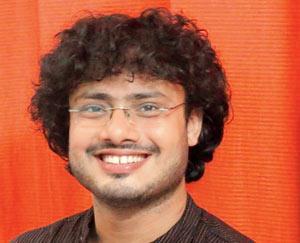
Saqib Khan
In the last one week, says Saqib Khan, one of the founding members of the Progressive Students Forum (PSF), posters that support the ABVP's stance in JNU, screaming "anti-nationals go away" signed by "An Indian", have cropped up at TISS. "Clearly the work of the small group of right-wing identifiers," he comments. But, it's not just posters.
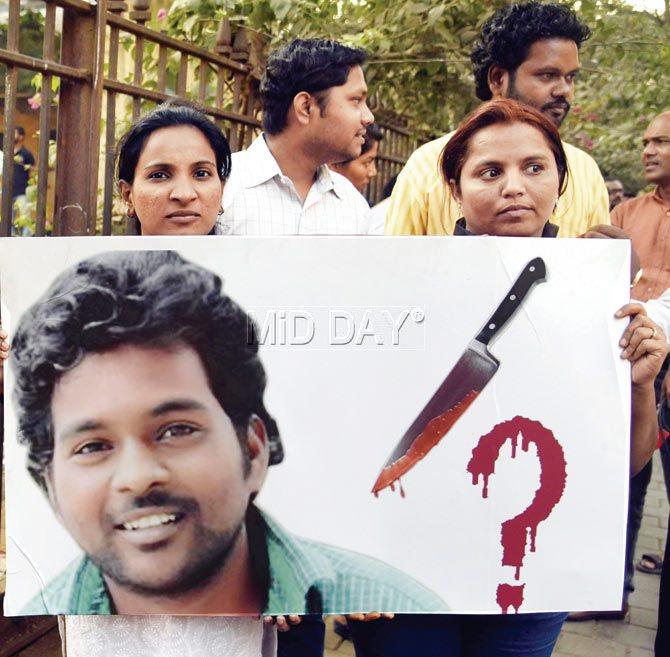
Students from Mumbai participate in a silent protest against Rohith Vemula’s suicide, linked to discriminatory treatment by Hyderabad Central University, on January 21. Pic/Atul Kamble
While there is no official group that identifies itself with right wing ideologies, he says, "they have begun to voice their opinions in a more organised and visible way than before on campus." To give an example, he talks of a January talk on campus by right-wing ideologue Rajiv Malhotra, which ended with students divided between pro- and anti-RSS sentiments. While free-thinking is encouraged on campus, what this points to is the rising popularity of right-wing ideology: if right-wing voices can be heard, even in a minority, on TISS, imagine their penetration in other campuses.
A history lesson here?
While student politics at JNU have largely been Left-dominated, Dr Shiv Shakti Bakshi, a former ABVP member, says the once "outsider party" gained support in 1996 when a programme was organised by Left outfits on the campus in support of Kashmiris separatists. "This was opposed by ABVP and general students came out overwhelmingly to support ABVP," he recalls, adding that the party first started gaining recognition during the late '80s and early '90s.
It was for the first time that ABVP was able to organise a massive procession on the campus. Support was spontaneous. In the ensuing student's election, ABVP swept all posts except that of the President, which it lost by a margin of four votes. Later on, the campus saw alignment and realignment of the forces within the Left. The JNUSU, which was earlier dominated by the All India Student's Association (AISA), was taken over by the AISA-SFI (Students Federation Of India) align.
In 1997, ABVP could win only the post of General Secretary and lost all seats in 1998. In 1999, ABVP won the post of joint secretary, and in 2000 the post of President and Joint-Secretary. It may have been defeated, but ABVP became a force to reckon with on campus.
Not Right Vs Left
Scratch under the very thin layer of right-wing/left-wing politics and a larger, perhaps deeper cause of worry, emerges — upper caste vs lower caste.
And, no where is it as evident as in Hyderabad.
From 50 members in its initial days, ASA, formed in 1993 in Hyderabad University, has more than 500 members now.
Its first electoral victory came two decades later when in 2011-12, ASA won the campus election after aligning with the Students' Federation of India (SFI). But, president of this ASA unit, Venkatesh Chouhan, says the University had initially given the impression of hostility towards Dalit students. "Student welfare issues raised by the ASA did not get much attention. Now, after Vemula's death, things are slowly changing on the campus," he says.
The ASA is the biggest Ambedkarite student party. Others, such as BAPSA (Birsa Ambedkar Phule Students Association) and DBPGSA (Dr Babasaheb Post Graduate Students Association) exist in JNU and Pune University respectively. While the ABVP, registered in 1949, is a national 'movement', the various Ambedkarite bodies are autonomous, and united only in ideology. For the first time, different student groups are coming under one roof to counter the upper-caste dominated ABVP, which is now cornered.
On the TISS campus, the ASA enjoys a unique position. Firstly, TISS (which is a deemed university) is one of few campuses in Maharashtra that conduct students elections — student elections were banned in state-affiliated universities after candidate from the National Students' Union of India (NSUI) Owen D'Souza was murdered in 1992 during the Mithibai College class representatives' elections. Secondly, with right-wing supporters (they haven't come together as one party yet), being a fledgling minority in TISS, their agenda lacks clarity.
"The group might voice their opinion strongly now, but when it comes to number, they don't stand a chance on the campus, both in student meetings as well as electorally," says Khan.
The ASA, on the other hand, on the TISS campus has a clearer agenda. Its evolution follows an SC/ST cell that was turned into TISS Scholars Group, which included SC, ST, OBCs and other minorities. Among its activities, the group organised Ambedkar memorial lectures. The founding members, says one of them, wanted to make Ambedkarite concerns more rooted, and thus formed the ASA in 2014 as a political front to the existing TISS Scholars Group. Ajinkya Chandanshive, a member of the interim core committee of the ASA unit at TISS, says that they are in the process of drafting a constitution.
"We are not just positioned against the ABVP, but all Brahminical and patriarchal ideologies," he says, clarifying that ASA doesn't work against specific parties, but against ideologies.
Chandanshive observes that the ABVP's aggressive stance is a counterstrike to the rise of Ambedkarite student parties. "TISS was known earlier for its Gandhian and Left ideologies. Now, the presence of Ambedkarite thought is strong here, as in JNU. The recent upsurge of the ASA has become a concern for the ABVP," says Chandanshive, an MPhil Women's Studies student at TISS.
Parthasarthi Mondal, assistant professor at TISS's School of Development Studies, says, the worrying trend is not the rise of the ABVP, but of the lack of theoretical frameworks. The challenge is to keep in mind the Dalit position, which gets compromised in the debate between the Left and the Right. "The ASA gets occluded from the picture. The ultimate basis for all conflict here is caste —which gets converted into class or gender unfortunately. We don't like it if the Hindu social order is shaken," he concludes.
Arrogance of the rulers
The ABVP agenda on its website states: "We are above 'partisan politics' but we accept that social activity cannot be non political in a strict sense."
The political nature, argues, Chouhan, is on the fore at Hyderabad University where ABVP is no more a student organisation. "They are implementing the BJP's ideology; they are terrorising other students while the BJP government plays politics," he alleges.
Pravin More, private secretary to Rajya Sabha member Ramdas Athawale of Republican Party of India (Athawale) is of the opinion that the ABVP is getting a 'rajashray' — the psychological support of the right wing in power. "The ideological gurus are involved in student activities," he says.
Dr Vijay More, RPI Youth General Secretary Maharastra State, says that ABVP has become a stepping stone for those who want to gain entry into the BJP and that this is happening at colleges across the city, especially in colleges such as Ruparel, Ruia and Kirti. While the principal of Ruia College, the principal of Kirti College said that while a number of student parties exist on campus, elections are banned, and they are cordial with each other. An official from Ruparel college, not wishing to be identified, denied More's statement and said, "Student party membership on college campuses are the choice of students. Campaigning on campuses is not permitted. All activities have to be conducted outside the campus. The question of students and politics is one that can be debated. While on the one hand, students need to be shown the principles of democracy and their rights, campus politics can be avoided. Colleges and education should be kept free of politics."
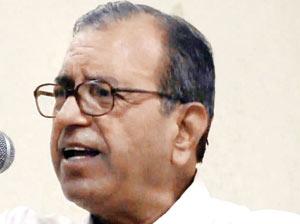
Prof G Haragopal
ABVP's arrogance, says Prof G Haragopal, distinguished political scientist, and a current ICSSR National Fellow with the TISS, Hyderabad, says, has only increased with the BJP at the Centre. "Their emboldened sense of ownership, backed by faculty members and the University's administration, only led the Dalit students to feel alienated," he says.
In his 25-year career at the Hyderabad University, he has seen the rise and downfall of ABVP. The ABVP was almost always dominated by the upper-caste and believed that the university was its oyster. The problem, he feels, is psychological at one level and structural at another. "The privileged caste faculty is not very cordial towards Dalit boys and girls coming from rural backgrounds," he says. "At the same time, the upper-caste boys and girls think they own the university."
Tremors within
But, recent events feels Haragopal, may be causing ABVP to lose its ideological hold. All other wings of the student unions are joining hands with the ASA in protest of Vemula's death. Even a group of upper caste students and female students are not supporting ABVP. While ABVP lost the elections last year at Hyderbad, its biggest public loss has been the resignation of three of its members in the post-JNU row —Pradeep Narwal, Rahul Yadav and Ankit Hans.
Narwal, former Joint Secretary of JNU unit of ABVP, who had quit the party, said, "I quit ABVP because of Rohith Vemula incident, JNU incident and Manusmiriti's caste system."
Expressing anguish over the assault on mediapersons and JNU students and teachers in Patiala House Court complex on Monday as well as the attack on JNUSU President Kanhaiya Kumar in the same court complex on Wednesday, Yadav, former President of ABVP unit of JNUs School of Social Sciences (SSS), alleged that the government was 'legitimizing' the actions of right-wing fascist forces. Yadav said, "I cannot be the mouthpiece of such a government which has unleashed oppression on the student community, in the name of expanding the base of ABVP."
In politics, fortune is a temperamental friend. But, whether ABVP is on the rise or fall, it has left lessons behind in its wake.
Anil Kumar, vice-president JNU Delhi state unit of NSUI, says, "We should change our approach to expand our base. The time has come for an internal assessment of our policy. Like ABVP, we should also start using the national flag along with NSUI and the Congress flag and should chant Vande Mataram. ABVP doesn't have a copyright on it. We also need to draw in greater numbers as members by using a simple database sheet." Meanwhile, NSUI has decided to participate in the peace march on Monday from Rajghat to India Gate organised by Narwal, Yadav and Hans.
Current or former, on-the-rise or in-the-slump, ABVP has just mastered the political art of staying in the news.
 Subscribe today by clicking the link and stay updated with the latest news!" Click here!
Subscribe today by clicking the link and stay updated with the latest news!" Click here!







